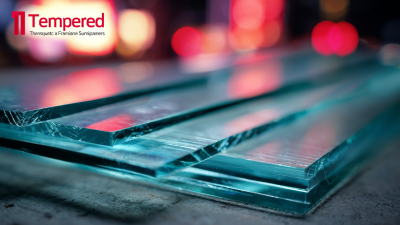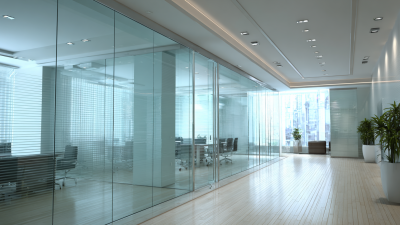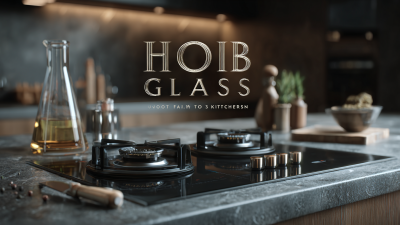
In the realm of modern kitchen appliances, the selection of the right materials can significantly impact both performance and safety. Toughened glass for ovens has emerged as a crucial component, known for its ability to withstand high temperatures and thermal shock. According to a report by Grand View Research, the demand for toughened glass in both residential and commercial applications is expected to grow at a compound annual growth rate (CAGR) of 7.3% from 2021 to 2028. This surge highlights the importance of understanding the various options available when selecting toughened glass for ovens, ensuring durability and efficiency in cooking environments. With an increasing emphasis on energy efficiency and robust construction in kitchen design, knowing how to choose the best toughened glass for your oven can enhance not only the performance of the appliance but also the safety of the cooking process.

Toughened glass, also known as tempered glass, is an essential material for modern ovens, thanks to its remarkable properties. Unlike regular glass, toughened glass undergoes a heating and cooling process that enhances its strength, making it much more resilient to thermal shock. This means it can withstand high temperatures and sudden changes in heat, which are common in oven environments. As a result, toughened glass is less likely to shatter or break under these conditions, providing not only durability but also safety for users.
In addition to its strength, toughened glass offers excellent clarity and aesthetic appeal, allowing users to monitor their cooking without opening the oven door. This feature contributes to energy efficiency, as it helps maintain consistent cooking temperatures. Furthermore, toughened glass is easy to clean, resistant to stains, and often treated to reduce glare. These benefits make it a preferred choice for oven doors and panels, ensuring that every home cook can enjoy both functionality and style in their kitchen appliances. Understanding these properties is crucial when selecting the best toughened glass for your oven, ensuring it meets your specific cooking needs and preferences.
| Property | Description | Benefits |
|---|---|---|
| Thermal Resistance | Can withstand high temperatures up to 600°C. | Ideal for ovens, preventing breakage from thermal shock. |
| Strength | 5 to 7 times stronger than normal glass. | Enhanced durability, reducing the likelihood of breakage. |
| Safety | In case of breakage, it shatters into small, blunt pieces. | Minimizes risk of injury compared to regular glass. |
| Versatility | Suitable for various appliances beyond ovens. | Allows for wider application in kitchen design. |
| Aesthetic Appeal | Available in different finishes and edge designs. | Enhances the look of kitchen appliances, contributing to style. |
When it comes to oven materials, toughened glass stands out due to its unique combination of durability and aesthetics. Unlike traditional materials such as ceramic or metal, toughened glass is engineered to resist thermal shock, with studies showing it can withstand temperature changes of up to 300°C (572°F) without cracking. This property makes it particularly beneficial for high-heat oven environments where other materials might warp or degrade over time.

Additionally, toughened glass offers a clear view of the cooking process, allowing for better monitoring without the need to open the oven door, which can disrupt heat circulation. A report from the Glass and Glazing Federation highlights that toughened glass is three to five times stronger than standard glass, reducing the risk of breakage. Meanwhile, when compared to metal, toughened glass is non-reactive, meaning it won't impart any metallic flavors to food, further enhancing the overall culinary experience. This combination of strength, safety, and functionality makes toughened glass an ideal choice for modern ovens.
When selecting toughened glass for your oven, understanding the performance characteristics of various alternatives is crucial. Strength and heat resistance are two primary factors that can significantly influence the durability and safety of your cooking appliance. Toughened glass, often known as tempered glass, is engineered to withstand high temperatures and sudden thermal changes. This property makes it ideal for oven use where the heat can fluctuate dramatically during cooking.
In addition to heat resistance, the strength of the glass plays a pivotal role in its longevity. High-quality toughened glass is designed to endure mechanical stress, which is imperative in a busy kitchen environment. When evaluating options, look for products that meet industry standards for safety and performance. Considerations such as thickness and the manufacturing process also contribute to how well the glass will perform under both heat and physical strain. Ultimately, investing in the right toughened glass will enhance your oven's functionality and, more importantly, ensure your cooking is safe and efficient.
When choosing toughened glass for your oven, it's essential to strike a balance between cost and quality. According to a recent report by "Glass Industry Insights," toughened glass doors account for over 60% of the oven market due to their durability and safety features. While cheaper options may seem enticing, they often compromise on thermal resistance and impact strength. Research indicates that high-quality toughened glass can withstand temperatures up to 600°C without compromising structural integrity, whereas lower-grade products may begin to warp or shatter at significantly lower temperatures.
Investing in high-quality toughened glass not only enhances the longevity of your oven but also ensures better energy efficiency. A study by the "International Journal of Appliance Technology" found that ovens equipped with premium toughened glass retain heat more effectively, which can reduce cooking times and energy consumption by up to 20%. This efficiency not only saves on utility bills but also contributes to a more sustainable kitchen environment. Ultimately, while the initial investment in quality toughened glass may be higher, the long-term benefits in safety, efficiency, and performance make it a wise choice for any serious home cook.

When selecting toughened glass for your oven, it’s not just about durability and heat resistance; it's also crucial to consider eco-friendly choices. Many manufacturers now offer sustainable alternatives that not only perform exceptionally well but also reduce environmental impact. Recycled glass products, for instance, are becoming increasingly popular in the culinary world. By opting for toughened glass made from recycled materials, consumers can significantly lessen their carbon footprint while still enjoying the benefits of a versatile and resilient cooking surface.
Another eco-friendly option is glass that has been treated with natural, sustainable processes. Some brands utilize minimal chemical treatments to enhance strength and thermal resistance without compromising environmental integrity. By choosing these sustainable alternatives, you are not only investing in a high-quality product but also supporting practices that prioritize the health of our planet. It's essential to look for certifications and labels that indicate a product's eco-friendliness, ensuring that your choice aligns with a more sustainable lifestyle.





